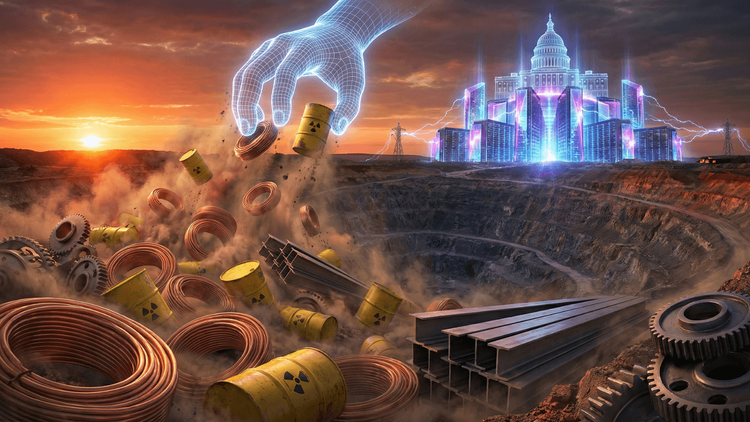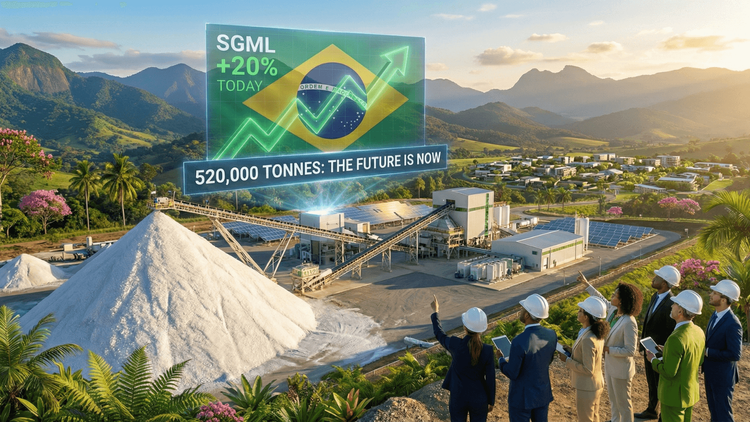Rock Solid Strategy: Trump Drills Into China’s Supply Chains
Inside Trump’s High-Stakes Plan to Reclaim America’s Mineral Independence from China’s Global Stronghold

In a bold move to end America’s critical mineral dependence on China, the Trump administration is preparing to go beyond rhetoric and cut real checks. With the global balance of power increasingly shaped by who controls the raw materials of the 21st-century economy—lithium, rare earths, cobalt, and more—the U.S. is now plotting its comeback. Interior Secretary Doug Burgum, speaking from the Hamm Institute for American Energy, made it clear: America will no longer play defense in the minerals game. It’s time to mine, invest, insure, and stockpile.
Rebuilding America’s Resource Backbone
At the heart of this initiative is an idea that’s both simple and revolutionary: the United States government should directly invest in companies developing domestic sources of critical minerals. This includes miners, refiners, and processors who are often battling Chinese state-backed firms that flood the global market with cheap product, artificially depressing prices.
Burgum framed the current market as economic warfare. U.S. firms aren’t just competing against businesses—they’re going up against Beijing’s geopolitical strategy. And they’re losing. “You’re competing against state capital,” Burgum said, pointing directly at China's strategic manipulation of mineral markets. The result? America is dangerously reliant on a rival superpower for materials essential to everything from F-35 fighter jets to electric vehicles and smartphones.
State-Backed Capitalism vs. Market Naivety
For decades, China has led a coordinated, aggressive campaign to dominate the global mineral supply chain. They've invested heavily in mines across Africa, Latin America, and even parts of Southeast Asia. But more importantly, they’ve turned their supply dominance into a geopolitical tool. Earlier this month, Beijing struck back at Trump’s tariff hikes by restricting exports of rare earth elements—used in lasers, radar, EV motors, and missile guidance systems.
The data is as damning as it is eye-opening. In 2024, 80% of the rare earths consumed in the U.S. were imported. Seventy percent came directly from China. That’s not just a trade imbalance. That’s a strategic liability.
A Sovereign Wealth Fund for Miners
To fight fire with fire, Burgum floated an idea usually reserved for petro-states: a sovereign wealth fund. Rather than passively encouraging private investment, the federal government would take equity stakes in U.S. companies focused on mining and processing strategic materials. These wouldn't be blind investments. They’d be targeted bets on firms actively pushing back against Chinese dominance.
Burgum didn’t shy away from the comparison. “Why wouldn’t the wealthiest country in the world have the biggest sovereign wealth fund?” he asked. It’s a rhetorical question with teeth. If America has the resources, why not deploy them strategically?
Insurance Against Political Flip-Flops
In Washington, no investment is ever safe from politics. Recognizing that a future president could easily kneecap mining projects with a single executive order, the Trump administration is also looking at sovereign risk insurance. This wouldn’t just protect companies from economic risk—it would shield them from political reversals.
Think of it as an insurance policy backed by the federal government. If a future administration comes in and cancels a project, the companies would be reimbursed. “You got to write a check,” Burgum said. “There’s got to be a financial cost if you’re going to do these decisions where you’re destroying our balance sheet or destroying a company’s opportunity.”
Strategic Stockpiles: America’s Mineral Reserve
The third pillar of this strategy is simple but powerful—stockpiling. Just as the U.S. has long held a Strategic Petroleum Reserve, the Trump administration is exploring a Strategic Minerals Reserve. When China floods the market with cheap minerals to undercut competitors, America won’t panic—it will buy.
This counter-cyclical approach stabilizes the market, protects U.S. companies, and ensures that strategic industries never run short of essential materials. “Those three things would put us in the game around critical minerals,” Burgum concluded. “The stockpiling, the sovereign risk insurance and the ability to take an equity position. We’re working on all three.”
A New Era of Resource Nationalism
Make no mistake—this is resource nationalism with an American twist. Trump isn’t proposing the nationalization of the mining sector. He’s proposing a state-capitalist toolkit that gives U.S. companies the firepower to compete on an uneven battlefield. The free market alone hasn’t been enough. What’s needed now is a hybrid approach—government support without government control.
This is about more than minerals. It’s about sovereignty. As Burgum put it, “It’s not just drill, baby, drill. It’s mine, baby, mine.” The phrase echoes loudly across a political landscape now acutely aware of how vulnerable America has become by outsourcing the dirty work of extraction.
National Security at Stake
This isn’t an economic side issue. It’s national security. Modern warfare, advanced aerospace, clean energy tech, AI systems—none of it functions without rare earths and other critical minerals. The Department of Defense has said as much. So has the Department of Energy.
If America wants to remain a technological and military superpower, it must control its inputs. And right now, China holds the keys. That’s the urgent message the Trump administration is acting on.
Economic Independence Requires Industrial Muscle
Beyond the defense angle, there’s also an industrial renaissance narrative unfolding. Reshoring manufacturing is meaningless without reshoring the supply chains that feed it. It’s like trying to bake a cake without flour. U.S. miners have long been starved of capital and left for dead in the regulatory wasteland. Now, they could be the frontline soldiers in a larger economic war.
The Political Terrain Ahead
Implementing these policies won't be easy. Sovereign wealth funds, insurance backstops, and government equity in private firms are ideas sure to face opposition from fiscal conservatives and environmental activists alike. But Burgum’s speech wasn’t about winning everyone over—it was about planting a flag.
The message to investors, allies, and adversaries alike: America is back in the mining game.
Conclusion: Mine, Baby, Mine
The era of mineral complacency is over. Trump’s strategy signals a decisive pivot toward self-reliance, resilience, and economic strength. While China has weaponized its mineral dominance, the U.S. is finally gearing up to respond with the full force of its financial and industrial might. The road won’t be smooth, and the politics will be fierce. But the stakes—technological supremacy, energy independence, and national security—have never been clearer.






